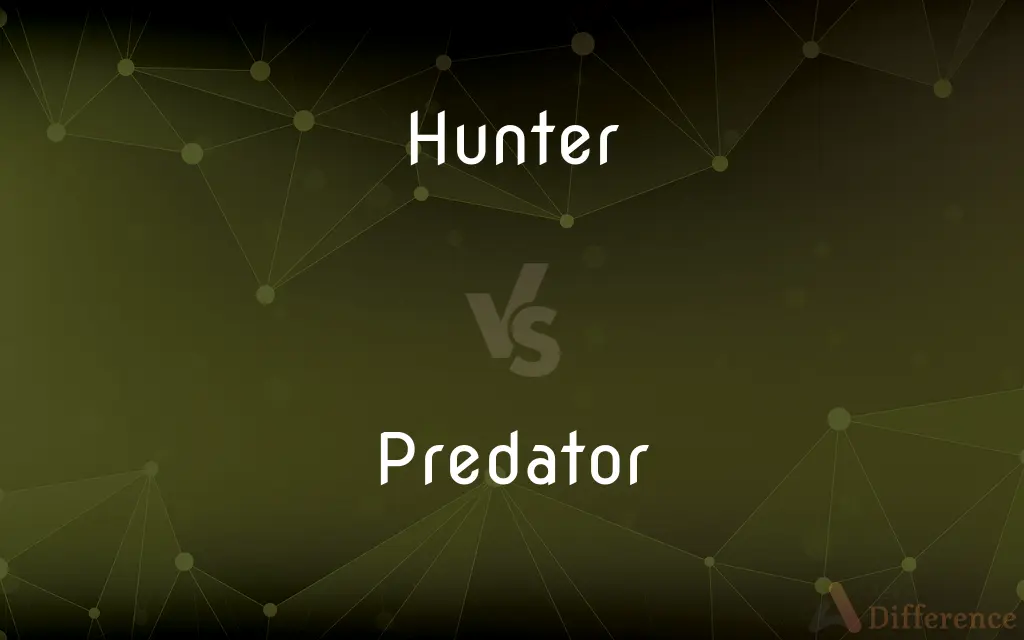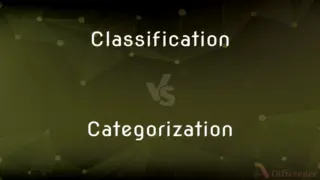Hunter vs. Predator — What's the Difference?
By Tayyaba Rehman — Updated on October 25, 2023
A hunter is a person or animal that hunts game or prey, while a predator is an animal that naturally preys on others.

Difference Between Hunter and Predator
Table of Contents
ADVERTISEMENT
Key Differences
A hunter often refers to a human who pursues game or wildlife for food, sport, or trade. Predators, on the other hand, are animals that hunt and kill other animals for sustenance. While the word hunter has a broader application, being applicable to both humans and animals, the term predator is predominantly reserved for the animal kingdom.
Hunters, especially in a human context, might use tools, weapons, or traps to aid in the capture or killing of their targets. Predators rely on their natural instincts, physical abilities, and sometimes cooperative strategies to catch their prey. For a human hunter, the act of hunting can be a choice, often driven by sport or tradition. For a predator, hunting is a natural and essential behavior for survival.
The motivation for a hunter can vary, from seeking food to acquiring trophies or even controlling population numbers. A predator hunts primarily out of the need for food. While both hunters and predators can be skilled in tracking and stalking, their techniques and strategies can be vastly different based on their respective needs and environments.
Hunters, in some cultures, are revered for their skills and play significant roles in rituals and traditions. Predators, in the ecological sense, play a crucial role in maintaining the balance of ecosystems by controlling the population of other species. Both hunters and predators, in their respective domains, impact the environment and the species they target.
Comparison Chart
Definition
Person or animal that hunts game.
An animal that naturally preys on others.
ADVERTISEMENT
Tools/Methods
May use tools, weapons, or traps.
Relies on natural instincts and abilities.
Motivation
Food, sport, trade, population control.
Primarily for sustenance.
Application
Can be applied to humans and animals.
Predominantly refers to animals.
Role
Cultural significance, population control.
Maintains ecological balance.
Compare with Definitions
Hunter
A person who hunts game or wildlife.
The hunter patiently waited for the deer to come closer.
Predator
A person who exploits or victimizes others, especially in a malicious way.
The community was warned about the financial predator scamming local residents.
Hunter
An animal that pursues and captures other animals for food.
The lion, a skilled hunter, stealthily approached its prey.
Predator
An animal that hunts, kills, and eats other animals.
The hawk is a fierce predator of small birds.
Hunter
Someone who searches diligently for something.
She was a hunter of rare antiques and artifacts.
Predator
A dominant species in its environment.
In the ocean, sharks are often considered apex predators.
Hunter
A person who seeks to control or reduce certain animal populations.
As a licensed hunter, he helps control the overpopulation of certain invasive species.
Predator
A competitor that takes advantage over others.
Big corporations can act as predators, buying out smaller businesses.
Hunter
One who hunts game.
Predator
An organism that lives by preying on other organisms.
Hunter
A dog bred or trained for use in hunting.
Predator
A person or group that robs, victimizes, or exploits others for gain.
Hunter
A horse, typically a strong fast jumper, that has been bred or trained for use in hunting.
Predator
Any animal or other organism that hunts and kills other non-plant organisms (their prey), primarily for food.
Hunter
One who searches for or seeks something
A treasure hunter.
Predator
Someone who attacks and plunders for gain.
Hunter
Hunter green.
Predator
A sexual predator.
Hunter
One who hunts game for sport or for food; a huntsman or huntswoman.
Predator
Someone who attacks in search of booty
Hunter
A dog used in hunting.
Predator
Any animal that lives by preying on other animals
Hunter
A horse used in hunting, especially a thoroughbred, bred and trained for hunting.
Predator
An organism that exists by preying upon other organisms.
The mantis is an effective predator in the insect world.
Hunter
One who hunts or seeks after anything.
The hunter becomes the hunted.
A fortune hunter
Hunter
(psychology) A person who bottles up their aggression and eventually releases it explosively.
Hunter
A kind of spider, the huntsman or hunting spider.
Hunter
A pocket watch with a spring-hinged circular metal cover that closes over the dial and crystal, protecting them from dust and scratches.
Hunter
One who hunts wild animals either for sport or for food; a huntsman.
Hunter
A dog that scents game, or is trained to the chase; a hunting dog.
Hunter
A horse used in the chase; especially, a thoroughbred, bred and trained for hunting.
Hunter
One who hunts or seeks after anything, as if for game; as, a fortune hunter a place hunter.
No keener hunter after glory breathes.
Hunter
A kind of spider. See Hunting spider, under Hunting.
Hunter
A hunting watch, or one of which the crystal is protected by a metallic cover.
Hunter
Someone who hunts game
Hunter
A person who searches for something;
A treasure hunter
Hunter
A watch with a hinged metal lid to protect the crystal
Hunter
A type of horse used in hunting.
She rode her hunter in the annual fox hunt.
Common Curiosities
Can the term hunter be applied to both humans and animals?
Yes, a hunter can refer to both humans and animals that pursue game or prey.
What drives a predator to hunt?
A predator primarily hunts for sustenance and survival.
Can a hunter be considered a predator?
While all predators are hunters, not all hunters (especially humans) are considered predators.
Is a predator always an animal?
Predominantly yes, but metaphorically it can describe a person who exploits others.
Is hunting always about capturing or killing?
No, some hunters, especially humans, might hunt for observation, sport, or catch and release.
Are all predators at the top of the food chain?
No, while some predators are apex predators, others have their own predators.
What are some natural abilities predators have?
Predators may have sharp claws, keen senses, speed, and stealth to aid in hunting.
Do hunters always kill their prey?
No, hunters, especially humans, may catch and release, or hunt for sport without killing.
Can a person be called a predator in a non-literal sense?
Yes, a person exploiting others, especially maliciously, can be metaphorically termed a predator.
What tools might a human hunter use?
A human hunter might use bows, guns, traps, and other tools.
Can the term hunter be used in non-literal contexts?
Yes, for example, someone searching for antiques might be called a "hunter" of rare items.
How do predators impact their ecosystem?
Predators help control prey populations, ensuring balance and health in the ecosystem.
Are there any animals that are both predators and prey?
Yes, many animals, like fish or certain birds, can be both predators to smaller species and prey to larger ones.
Why are predators important in nature?
Predators help maintain ecological balance by controlling the population of other species.
How do hunters contribute to conservation?
Some hunters help in population control and habitat restoration, and their licenses often fund conservation efforts.
Share Your Discovery

Previous Comparison
Halogen vs. Halide
Next Comparison
Classification vs. CategorizationAuthor Spotlight
Written by
Tayyaba RehmanTayyaba Rehman is a distinguished writer, currently serving as a primary contributor to askdifference.com. As a researcher in semantics and etymology, Tayyaba's passion for the complexity of languages and their distinctions has found a perfect home on the platform. Tayyaba delves into the intricacies of language, distinguishing between commonly confused words and phrases, thereby providing clarity for readers worldwide.














































